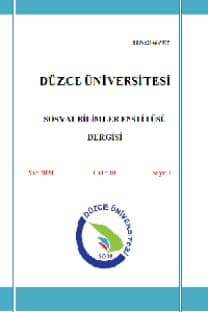TEKNOLOJİK ÖĞRENME, ÖRGÜTSEL ÖĞRENME VE AR-GE YETENEKLERİNİN ENTELLEKTÜEL SERMAYE ÜZERİNE ETKİSİ
Entelektüel sermaye günümüz iş dünyasında işletmelerin başarılı olmalarını etkileyen en önemli faktörlerden birisi olarak literatürde tartışılmaktadır. Bu nedenle entelektüel sermaye üzerinde etkili olan kurum içi faktörlerin ve etki düzeylerinin araştırılması önem arz etmektedir. Yürütülen araştırmada, örgütsel öğrenme, teknolojik öğrenme ve Ar-Ge yeteneklerinin, entelektüel sermaye üzerindeki etkileri ortaya çıkarılmaya çalışılmaktadır. Bu üç önemli faktörün, entelektüel sermaye üzerindeki ortak etkilerini analiz etmek için, Türkiye’de farklı alanlarda faaliyetlerini yürüten firmalarda çalışan 119 çalışan örneklem olarak belirlenmiştir. Araştırma sonuçları; örgütsel öğrenme ve teknolojik öğrenmenin, entelektüel sermaye üzerinde pozitif etkilerinin olduğunu göstermektedir
THE EFFECT OF ORGANIZATIONAL LEARNING, TECHNOLOGICAL LEARNING AND R&D CAPABILITIES ON INTELLECTUAL CAPITAL
In today’s business world, intellectual capital have been discussed as one of the most important factors that affect the success of businesses in the literature. Because of this, to explore the organizational (internal) factors that have important effect on intellectual capital is very critical. In this study, effects of organizational learning, technological learning and R&D capabilities on intellectual capital have been explored. The joint effects of these three critical factors on intellectual capital have been analyzed, and for this, a sample of 119 employees drawn from different organizations operating in Turkey has been used.The results suggest that organizational learning and technological learning positively affect intellectual capital
___
Chen, Y. (2008), The Positive Effect of Gren Intellectual Capital on Competitive Advantages of Firms, Journal of Business Ethics, (77), ss. 271-286.Dodgson, M. (1993), Organizational Learning: A Review o Some Literatures, Organization Studies, 14(3), ss. 375–394.
Huber, G. P. (1991), Organizational Learning: The Contributing Processes and the Literatures, Organization Science, 2(1), ss. 88-115.
Dai Z. ve Duserick, F. (2005), Achieving Competitiveness by Organizational Learning: Strategy, Transformation and Measurement, Issues in Information Systems, 4(2), ss. 147-153.
Ghosh, D. ve Wu, A. (2007), Intellectual Capital and Capital Markets: Addional Evidence, Journal of IntellectualCapital, 8(2), ss. 218-228.
Thompson, J. ve Richardson, B. (1996), Strategic and Competitive Success: Towards a Model of the Comprehensively Component Organization, Management Desicion, 34(2), ss.7-18.
Mcevily S. K. ve Chakravarty, B. (2002), The Persistence of Knowledge-based Advantage: An Empirical Test for Product Performance and Technological Knowledge, Strategic Management Journal, 23(4), ss. 285-305.
Marsick, V. J. ve Watkins. K. E. (2003), Demonstratingthe Value of an Organization’s Learning Culture: The Dimentions of the Learning Organizations Questionnaire, Advences in Developing Human Resources, 5(1), ss. 132-151.
Pena, I. (2002), Intellectual Capitaland Business Start-up Success, Journal of Intellectual Capital, 3(2), ss. 180-198.
Sanchez, R. (1995), Strategic Flexibility in Product Competition, Strategic Management Journal, 16(1), ss. 135-159.
Sackett, P. J., Maxwell, D. J. ve Lowenthal, P. A. (1997), Customizing Manufacturing Strategy, Integrated Manufactured Systems, 8(6), ss. 362-377.
Zahra, S. A. ve Nielsen, A. P. (2002), Sources of Capabilities, Integration andTechnologyCommercialization, Strategic Management Journal, (23), ss. 377-398.
- ISSN: 2146-5975
- Yayın Aralığı: Yılda 2 Sayı
- Yayıncı: Düzce Üniversitesi
